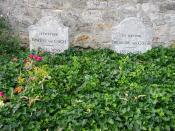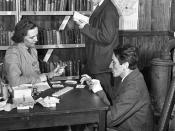Song of an Innocent Bystander - Analytical essay
'I am a bad person' is Freda's view of herself justified?
'From the mouths of babes comes the truth.' From the time these words are spoken Freda is O'Grady's favourite hostage, and through this she sees a chance to secure her own safety by staying on his good side. When the siege is over however Freda finds herself represented as a bad person by what Theo wrote on some napkins. Without anyone to tell her she's not bad, she is dominated by Theo's view of her as recorded on the napkins. The napkins, which implicate Freda in Theo's death, create problems for Freda because, by keeping them secret she is made to feel she has something to hide. It is as a result of these factors that in Freda's view she is a bad person.
'The bad man.'
is how Freda refers to John O'Grady. Though in implicating O'Grady as a bad man Freda is also revealing her view of herself as a bad person. From the very beginning of the siege O'Grady took a liking to Freda, calling her 'honey', an obvious sign of affection. Seeking safety Freda found that by befriending O'Grady she could at least have some control of her fate. As she grew older Freda began to feel that being able to connect with O'Grady must have meant that she too was as bad as everyone said O'Grady was. O'Grady was the only person Freda could connect with and the only person who showed any sign of friendliness to her during the siege. At the very beginning of the siege O'Grady asks the other hostages to take care of Freda. They all refuse to do so and she is placed in Theo's care on O'Grady's orders. Freda, having witnessed this would have felt unwanted which would make her more vulnerable to O'Grady's overtures of friendship and her feelings of having been an accomplice in his 'badness'
'There is something potent about written words. They can be held, scrutinized, each reading taking them further into the soul of the reader, planting them deeper.' Freda's mum, in an effort to protect Freda from being 'slaughtered' by the media hid the napkins that Theo had written on and, in effect changed the impact the siege itself for Freda. To a nine-year-olds' mind, the only reason to hide such information was because it was either bad or implicated someone as bad. The napkins became a testimony to Freda's 'badness'. Freda had no counseling after the siege and her mother was busy with lawsuits, seeking compensation for the impact of the siege on the basis of Freda being a victim. Freda let her imagination and her mind seize upon the apparent attack on her innocence that is portrayed in the napkins and fearing being persecuted by the media. She soon found her life dominated by them, to her everyone must be able to see she was bad, everyone must have noticed. In Freda's mind the napkins had been exaggerated to such an extent she could not find any good in herself and was constantly reminded by their presence that, in Theo's opinion, she was a 'crazy little bitch', 'freakish' and, 'sick in the head'. With words like this running through her head it is no surprise that throughout her teens Freda thought herself a bad person. The napkins became a guilty secret and Theo's views of Freda were unchallenged by Freda or anyone else, because of this Freda took Theo's word for fact and believed that the napkins revealed her true character.
'That crazy little bitch is telling him to shoot.' The napkins implicate Freda in Theo's death and O'Grady's suicide was directly linked to Theo's death. Freda, as the sole survivor of the three feels responsible. This leads to guilt and her belief she must be a bad person.
During the siege Freda had known the gun was not loaded, O'Grady had told her it wasn't. When Freda said 'Do it' (shoot Theo) she wished to scare Theo while O'Grady was threatening him. Freda was angry and wanted to punish Theo because Theo was trying to separate her from her way out, which was, she believed, with O'Grady. As the siege draws on Freda learns that O'Grady has been lying to her and so when he tells her he has loaded the gun Freda doesn't believe him. She doesn't intervene to stop him carrying out his threat to shoot Theo through the door. She probably feels guilty because had she believed him she might have been able to use some of her influence over O'Grady to protect Theo. It is this guilt which Freda feels supports her belief that she is a bad person.
Freda feels she is bad because of the way she is portrayed throughout Theo's napkins. Theo's accusatory words and negative perceptions of Freda survive as testimony after the siege. If Freda had had counseling or been able to give her account of what happened in the siege it would have been unlikely that Theo's view of her could have been so powerful in shaping her view of herself. Freda is not a bad person but she has been made to feel like one.


